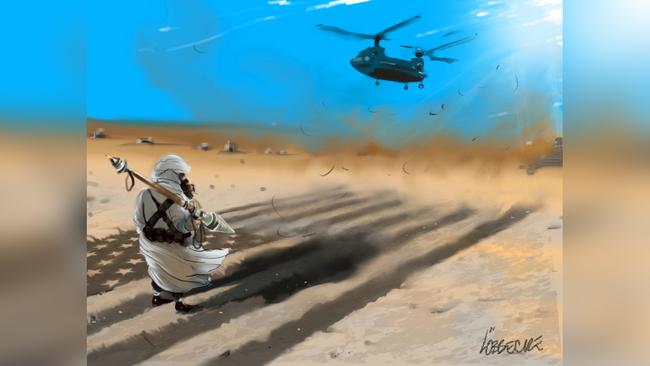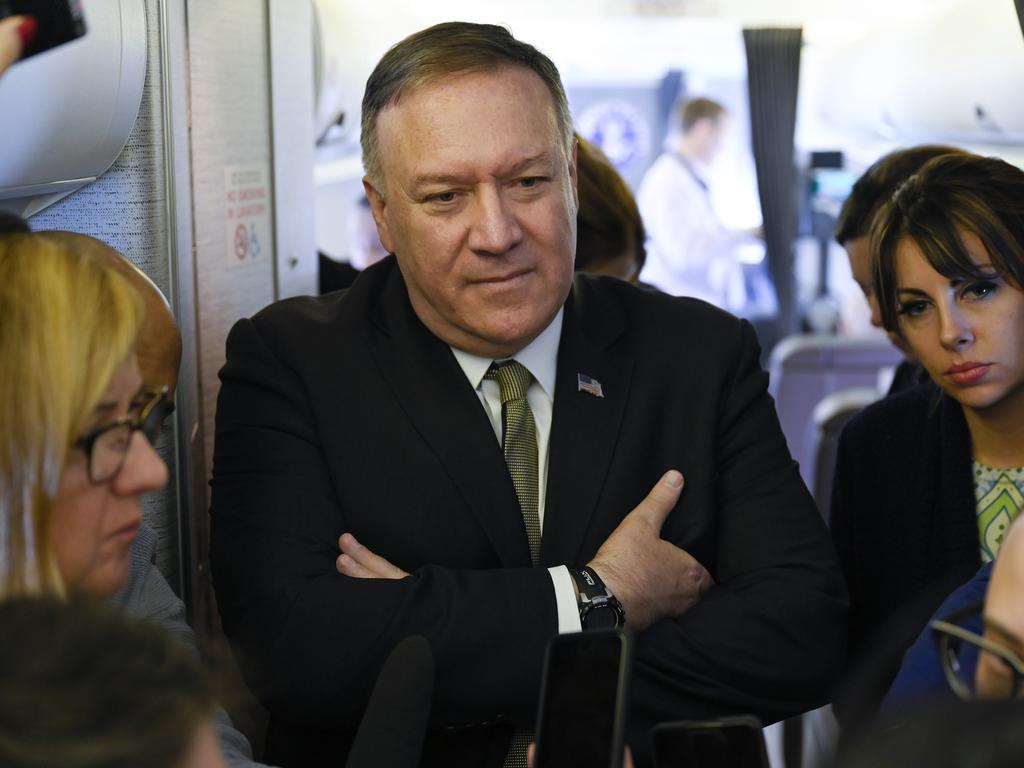
But I have no criticism of Trump in his desire to bring American troops out of Afghanistan. I have long argued that the West is achieving no long-term strategic objective there. It is an impossible situation, not remotely of Trump’s making. And his attempt to get Americans out is what he promised as a candidate and what his countrymen want. But there will be a cost.
That Trump’s decision attracted so little attention in Australia is an indication that we were never entirely serious about this terrible conflict.
In 2001, not long after the 9/11 terrorist attacks in the US that killed 3000 people and were planned and co-ordinated by al-Qa’ida, then based in Afghanistan, president George W. Bush ordered an invasion. Bush took the legitimate decision to destroy the most pro-terrorist government and state in the world. The Taliban ruled Afghanistan and harboured al-Qa’ida, all in the cause of a global Islamist jihad.
Australia supported Bush’s decision and joined the war. Our troops performed magnificently. But 19 years later the Taliban is probably stronger than it has ever been since the Americans destroyed its government, and it is unclear whether the Kabul government of President Ashraf Ghani can survive.
The tragedy will come for those millions of ordinary Afghans who have tried to take advantage of the resources and the fragile, spasmodic calm the American presence brought. There are more hospitals than ever, more schools. Think of the Afghan girls who got to go to school because the Americans were there. The Taliban, in its religious and ideological extremism, held as the deepest doctrine that girls should receive no formal education.
Yet surely the Americans cannot stay forever. It is also true that while trying to do good the allied presence has sometimes done harm. This has happened when its personnel have misbehaved, but also in unintended ways. For example, one reason the Afghan government could not hire enough competent people to deliver government services was because the huge presence of international aid agencies had bid up the salaries of any Afghans with technical competence and language skills. Too many of the competent people were working for foreigners.
There were other problems in a moral grey zone. One of the most effective ways to prevent violence was to pay extremists not to fight. But that elicited a very temporary commitment to partial nonviolence at best, and swelled the extremists’ coffers when they returned to fighting.
The Afghans have paid a price for this long war. But the Americans are damned if they do and damned if they don’t. The Afghans also paid a terrible price for Taliban rule before American intervention. The US lost almost 2500 service personnel dead, and another 1700 civilian contractors. More than 20,000 Americans were wounded, many left with crippling, lifelong injuries. And the US spent $US1 trillion or so. That represents a big, long effort in anyone’s book.
Australians paid a price too. We lost 41 soldiers and 260 were wounded.
In the first years, I passionately supported the war effort. But gradually it became clear our government had no intention of fighting in a way that would have any strategic effect. And the Americans, for all their effort, were not able to produce a stable Afghan government that controlled its country.
Even as a journalist with no special influence, deciding to change from supporting the war effort to calling for us to leave was morally complex and personally challenging. Many friends were unhappy with me. I tried to make clear in everything I wrote my complete support for our soldiers. Some friends said I was dishonouring the sacrifice of the fallen Diggers. That is the hardest thing. But you cannot allow deep gratitude for a soldier’s sacrifice to lead to bad strategic decisions.
Some of the soldiers wrote to me, and sometimes they or their families would ring. I felt I had very little to offer them. All I could say was that I was on their side. None was ever cross with me for advocating withdrawal. One soldier wrote to tell me he had been convinced by my strategic arguments and had decided to leave the army. That brought home to me more than anything the duty people at home have to speak with some measure of responsibility about these matters.
I became increasingly critical of Australian governments. It is good, very good, that Australian governments took many measures to limit casualties. But at the same time almost the entire purpose of our deployment was alliance management with the US. That is a worthy purpose in the national interest. But we were in effect sending young men to their deaths in a military campaign for a non-military objective, for a diplomatic objective.
If we had ever believed the allied effort was as important as we claimed, and had a chance of success, we would have taken responsibility for an entire province or smaller area and we would have deployed meaningfully.
Can the US and its allies leave honourably? The deal the US has received from the Taliban is pretty rotten. At this stage, the US plans to pull out its remaining 12,000 troops over the next 14 months. In exchange, the Taliban has promised not to harbour terrorists, to have a prisoner swap with the Afghan government on terms that vastly favour the Taliban, and to engage in talks with the Afghan government.
There is an understandable trace of incoherence in the Trump administration’s position. Defence Secretary Mark Esper says if the Taliban doesn’t honour the deal the US drawdown may be delayed. But there is no chance the Taliban will honour the deal.
The terms of the deal are less important than how the US treats its Afghan allies after it leaves. It must provide them with enough money, and enough air force, to give them a chance to win their own battles and make their own negotiations. The conflict is not only ideological but also ethnic, and a bitter truce among the warring parties may be the best long-term hope. The worst doesn’t bear thinking about.
But US policymakers should bear one thing in mind above all else — the thing that counts the most is not how you treat your enemies but how you treat your friends.







Donald Trump’s peace deal with the Taliban in Afghanistan is of course not worth the name it has. For one thing is sure, it won’t bring peace. It will bring tragedy.